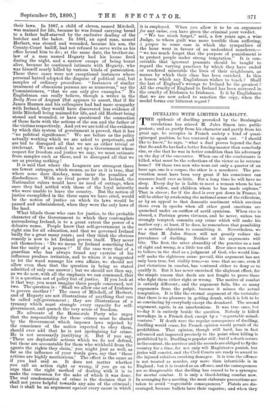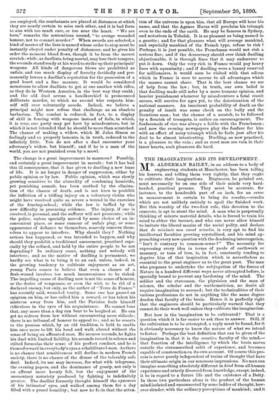DUELLING WITH LIMITED LIABILITY. T HE epidemic of duelling provoked by
the Boulangist revelations has stirred M. Jules Simon into public protest; and as, partly from his character and partly from his great age, he occupies in French society a kind of quasi- episcopal position, he has ventured to speak out. "I should like to know," he says, "what a duel proves beyond the fact that So-and-So has had a better fencing-master than somebody else, or else that he was in better condition than his adversary on the day of the encounter. When one of the combatants is killed, what must be the reflections of the victor as be returns home P Of those two men who went out only a quarter of an hour ago, one is a corpse, the other is a murderer. The pro- vocation must have been very great if his conscience can reassure itself ever so little. For a long time he will have no sleep. Every day he is liable to meet a woman whom he has made a widow, and children whom be has made orphans." That is clever ; for if the duel is ever put down in France, it will be either by awakening the national sense of the ridiculous, or by an appeal to that domestic sentiment which survives there even in epochs when all other good emotions are quenched under an outflow of acrid cynicism. When vice is absurd, a Parisian grows virtuous, and he never, unless too- strongly tempted, commits any crime which will make his mother cry ; at least, if he does, he remembers that possibility as a serious objection to committing it. Nevertheless, we fear that M. Jules Simon will not greatly reduce the prevalence of duelling. Neither of his arguments will bite. The first, the utter absurdity of the practice as a test of right and wrong, is a little too old. Ever since men ceased to believe in the duel as a judgment of God, who would him- self make the righteous cause prevail, this argument has not only been true, but visibly trae,—so true that no one, even if just victorious in combat, has ventured either to deny or to qualify it. But it has never exercised the slightest effect, for the simple reason that duels are not fought to prove those who fight them either right or wrong. The motive of combat is entirely different; and the argument fails, like so many arguments from the pulpit, because it misses the actual temptation. It is like the eternal argument of the teetotaler that there is no pleasure in getting drank, which is felt to be so convincing by everybody except the drunkard. The second argument, again, is an anachronism. It was true once, but to-day it is entirely beside the question. Nobody is killed nowadays in a French duel, except by a "regrettable misad-
venture." If death were the regular consequence of duelling, duelling would cease, for French opinion would permit of its prohibition. That opinion, though still hard, has in fact advanced and improved precisely to the point when killing is prohibited by it. Duelling is popular still ; but if a death occurs in the contest, the survivor and the seconds are obliged to fly the country for a time, for not only will Magistrates punish, but juries will convict, and the Civil Courts are ready to award to the injured relatives crashing damages. It is true the offence is not treated as murder, any more than infanticide is in England ; but it is treated as an offence, and the consequences are so disagreeable that duelling has ceased to be a synonym for mortal combat. It is only a blood-letting combat now. In arranging for a meeting, the most elaborate precautions are taken to avoid "regrettable consequences." Pistols are dis- couraged, because bullets have their vagaries ; and when they are employed, the combatants are placed at distances at which they are nearly certain to miss each other, and it is bad form to aim with too much care, or too near the heart. "We are here," remarks the sententious second, "to avenge wounded honour, not to commit murder." When swords are selected, a kind of master of the lists is named whose order to stop must be instantly obeyed under penalty of dishonour, and he gives his order the moment blood flows, though it be from the merest scratch; while, as duellists, being mortal, may lose their tempers, the seconds stand ready at his word to strike up their principals' weapons. All kinds of dangerous blows are prohibited as unfair, and too much display of ferocity decidedly and per- manently lowers a duellist's reputation for the possession of a good heart and a fine manner. It would be considered monstrous to allow duellists to get at one another with rifles, as they do in Western America, in the best way they could ; and the old duel across a handkerchief is pronounced deliberate murder, to which no second who respects him- self will ever voluntarily accede. Indeed, we believe a principal might now refuse that challenge as an obsolete barbarism. The combat is reduced, in fact, to a display of skill in fencing with weapons instead of foils, in which, it is true, one party may get hurt by misadventure, but in which it is not intended that he should be more than scratched. The chance of making a widow, which M. Jules Simon so feelingly and so properly laments, is, in truth, reduced to the infinitely little. You do not after a duel encounter your adversary's widow, but himself ; and if he is a man of the world, you are not punished even by a scowl.
The change is a great improvement in manners ? Possibly, and certainly a great improvement in morals ; but it has had this ill consequence, that it has given to duelling a new lease of life. It is no longer in danger of suppression, either by public opinion or by law. Public opinion, which was slowly growing sensitive to the absurdity of condoning homicide, yet punishing assault, has been soothed by the elimina- tion of the chance of death, and is not keen to prohibit the infliction of a trifling injury on a voluntary victim who might have received quite as severe a wound in the exercises of the fencing-school ; while the law is baffled by the new difficulty in procuring evidence. The injury, if one is received, is personal, and the sufferer will not prosecute; while the police, unless specially moved by some choice of an in- convenient place, or some rumour of unfair play, or some appearance of defiance to themselves, scarcely concern them- selves to appear to interfere. Why should they ? Nothing serious has happened, or was intended to happen, and why should they prohibit a traditional amusement, practised espe- cially by the refined, and held by the entire people to be not degrading ? In ordinary cases, nothing and nobody will interfere; and as the motive of duelling is permanent, we hardly see what is to bring it to an end, unless, indeed, in the growing tendency to cultivate enjoyment as an art, young Paris comes to believe that even a chance of a flesh-wound involves too much inconvenience to be risked. The impelling cause of duelling now is not the sense of honour, or the desire of vengeance, or even the wish to be rid of a declared enemy, but only, as the author of "Terre de France" has recently said, wounded vanity. Some one has passed an epigram on him, or has called him a coward, or has taken his mistress away from him, and the Parisian feels himself ridiculous in the eyes of his acquaintance. He cannot bear that, any more than a dog can bear to be laughed at. He can get no redress from law without encountering more ridicule ; there is no tribunal of honour to appeal to ; and so he resorts to the process which, by an old tradition, is held to enable him once more to lift his head and walk abroad without the sense of being an affronted man. He secures seconds, he fights his duel with limited liability, his seconds record in solemn and stilted formulas their sense of his perfect conduct, and he is thenceforward in everybody's eyes a rehabilitated man. As there is no chance that sensitiveness will decline in modern French society, there is no chance of the disuse of the tolerably safe duel. Indeed, its use may increase, for what with telegrams, the evening papers, and the dominance of gossip, not only is an affront more keenly felt, but the enjoyment of the momentary notoriety produced by fighting is indefinitely greater. The duellist formerly thought himself the cynosure of his intimates' eyes, and walked among them for a day filled with a proud humility ; but now he feels that the atten-
tion of the universe is upon him, that all Europe will hear his name, and that the Agence Havas will proclaim his triumph even to the ends of the earth. He may be famous in Sydney, and notorious in Tobolsk. It is as pleasant as being named in a gazette ; and for that pleasure what will average mankind, and especially mankind of the French type, refuse to risk ? Perhaps, it is just possible, the Frenchman would not risk a serious fine; and if the democracy should ever think duelling objectionable, it is through fines that it may endeavour to put it down. Only the very rich in France would pay heavy fines with equanimity ; and if duelling were a luxury reserved for millionaires, it would soon be visited with that odium which in France is sure to accrue to all advantages which the masses cannot share. That is the best chance we see of help from the law ; but, in truth, our own belief is that duelling made still safer by a more humane opinion, and heavier punishment whenever by misadventure a fatal result occurs, will survive for ages yet, to the deterioration of the national manners. An imminent probability of death as the penalty of insult was some check on the bully and the licentious man ; but the chance of a scratch, to be followed by a flourish of trumpets, is rather an encouragement. The fanfaronade of vice was always a foible with the Frenchman ; and now the evening newspapers play the fanfare for him with an effect of noisy triumph which he feels just after his duel to be almost intoxicating. Duelling, as now practised, is a pleasure to the vain ; and as most men are vain in their inner hearts, such pleasures die hard.



































 Previous page
Previous page